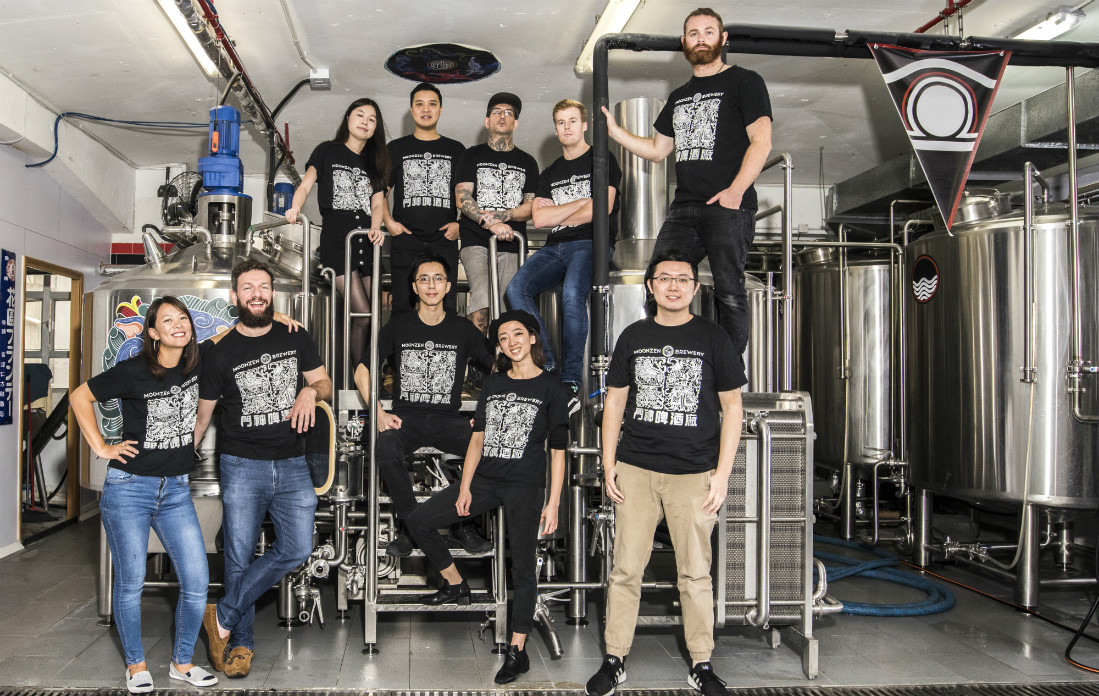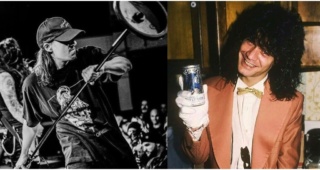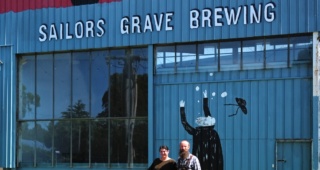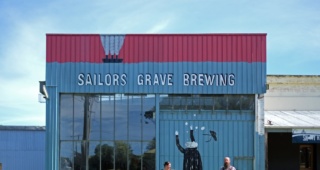Moonzen Brewery co-founder Laszlo Raphael says his brewery navigates a terrain it “won’t go beyond,” but don’t mistake brand (and beer) clarity for a lack of temerity.
When we last checked in on Moonzen, for instance, it was sitting on a barleywine that upon its debut six months later would become the world’s first beer aged in handmade clay barrels previously used for huangjiu, or Chinese yellow wine. It has brewed a Belgian-style tripel with Tibetan saffron, a dubbel with two types of Chinese mushrooms, and an imperial brown ale inspired by Sichuan-style dandan noodles, amongst many other experimental brews.
Moonzen has released more than 100 beers in all since its humble launch in 2014, when at the time it was by far the smallest of Hong Kong’s three craft breweries.
Back then Moonzen Brewery was a two-person show on the backs of Laszlo and partner/co-founder Michele Wong Raphael. The couple, who met while attending university in Beijing, operated in a space only slightly larger than a shoe box, and in a city far less open to craft beer than it is today. The brewery’s monthly capacity tapped out at 800 liters—less than a sixth of what Moonzen Brewery does in a single week these days.
Now a full-time team of 10 that includes three brewers, Moonzen Brewery does about 24,000 liters a month and is one of a handful of prominent local craft breweries commonly available at fancy supermarkets across Hong Kong. It has exported to Thailand for some time, and sends smaller shipments to restaurants in Australia and the UK, including London’s well-regarded Bun House.
Singapore is the brewery’s latest frontier. Moonzen recently collaborated with Singaporean craft brewery The 1925 Brewing Co on Dragon Phoenix—a saison inspired by a coffee-tea mixture popular in Hong Kong called yuenyeung—and visited the Lion City in mid-January to celebrate its newest export market. We catch up with the Raphaels and Moonzen Brewery sales director Trevor Au to circle back to that world’s first barleywine and discuss the brewery’s distinctively Chinese identity.
Beer Travelist: Last time we spoke Moonzen Brewery was gearing up to release the Chinese barrel lunar barleywine. How’d it turn out?
Laszlo Raphael: We were very happy with it. It came out really well, and it had some of the brett, which was nice because if it was just the terracotta it might have been too… odd, especially if you didn’t read the label. To be honest, though, it was too much effort. This year for our annual lunar new year release we did an American barleywine; you can really feel the heaviness and sweetness of the malts, and it has this almost berry-like finish.
Michele Wong Raphael: Maybe we’ll revisit the barrels in a few years’ time, but it really was a lot of work. For this barleywine we collaborated with a local artist called Mooncasket, who did the bottle artwork.
Mooncasket (responding by email): I met Moonzen at a design market that was held at their brewery. I’ve been told about a label competition for their Lunar Barleywine and thought that would be an interesting collaboration. I didn’t want [the labels] to be too serious, so instead I took a quirky approach on the Door Gods, with a retro comic-inspired colour palette. It was a fun little project to have my own take on the popular ancient Door Gods.
Beer Travelist: Did you try the barleywine before doing the art?
Mooncasket: I didn’t taste the barleywine until later on, when the artwork was finished. To be honest I’m more into lager; barleywine is too strong and intense for my taste. My boyfriend had 15 bottles of those last month. He wasn’t sure at the beginning, but it grew on him and now he’s hooked.
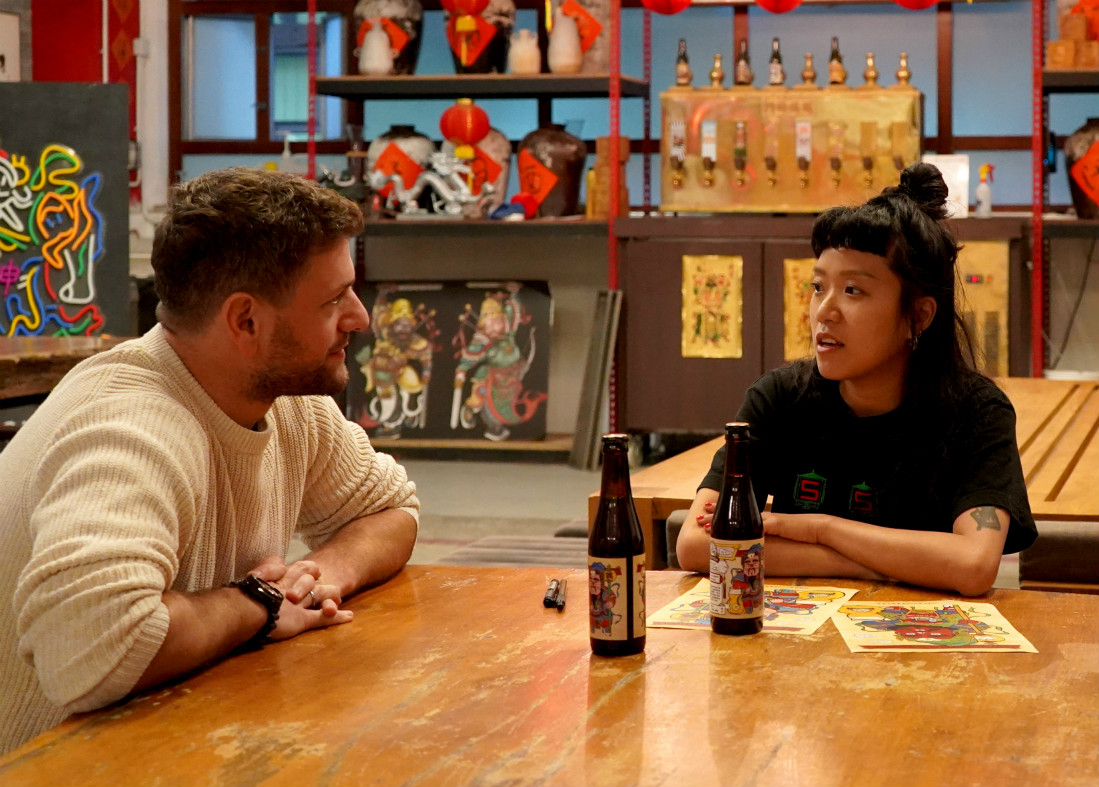
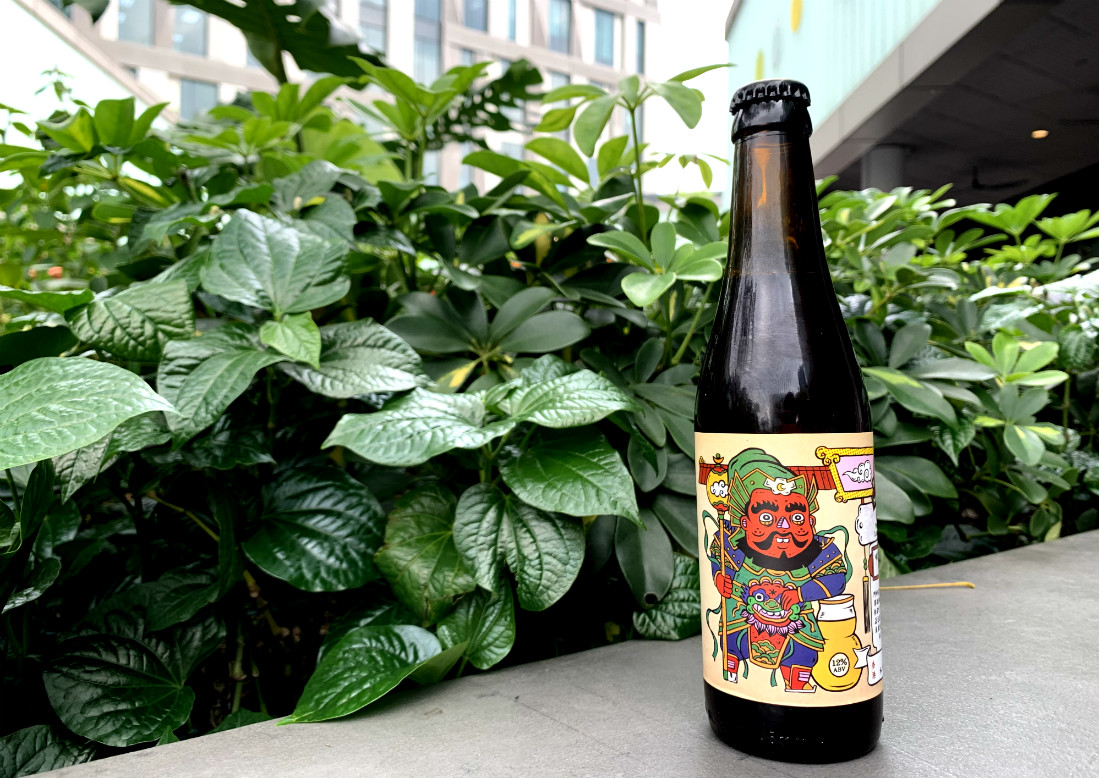
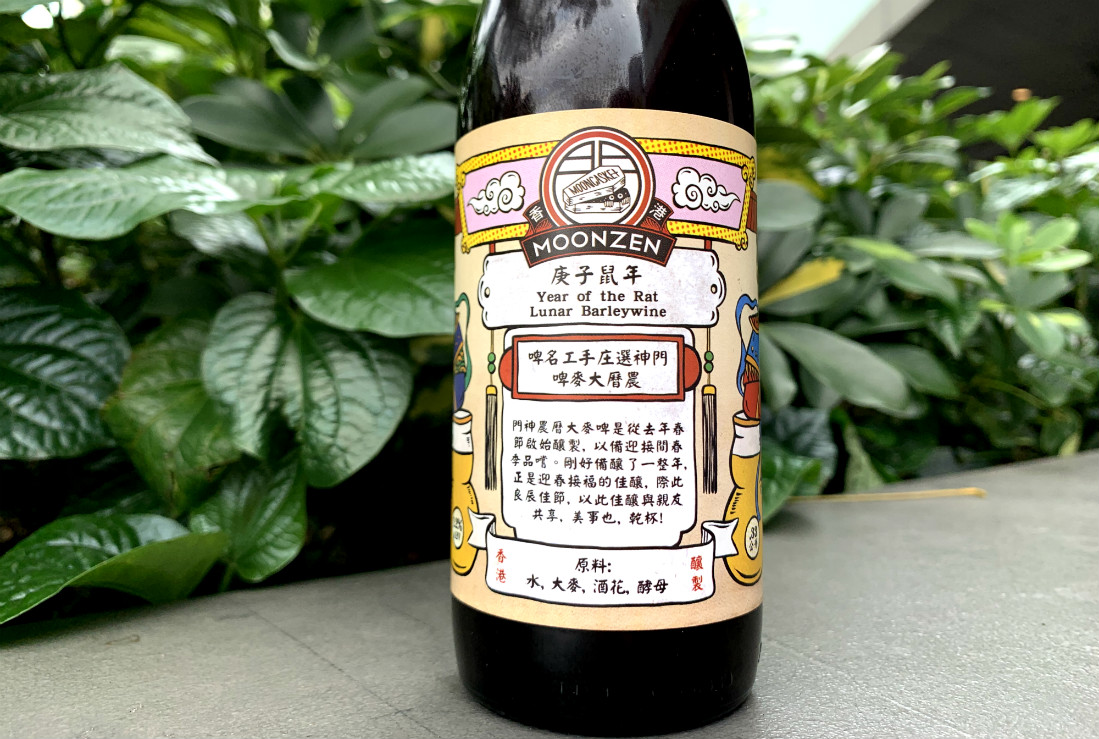
Laszlo: We’re doing more collaborations with non-beer entities, like Mooncasket, and regularly support local art galleries. We did a beer with a candy company, and have another one with a Chinese winery that does organic biodynamic wines. We got some red wine barrels from them, and used them to age for a full year our sixth anniversary brew, which is a raspberry barrel-aged stout. We’re launching it soon and are pretty happy with how it turned out.
Beer Travelist: There are obviously a lot of craft breweries working with retired wine barrels these days, but not many doing it with Chinese wine barrels.
Michele: We did another one, Flaming Mountains, which was one of our ‘Provincial Series’ beers, in this case Xinjiang province. For Xinjiang we usually think of things like cumin and lamb, but that province also has really great terroir that’s similar to Bordeaux. We got to be really friendly with the Italian winemaster at Puchang Vineyard, and they ended up shipping us a big bunch of muscat grapes. It was one of those projects that was very difficult to execute because bringing those grapes to Hong Kong was quite a feat, but we managed to get it done.
Laszlo: It was half must and half wort that we fermented with a strain of Champagne yeast. The latest one in that series is the Hainan Cocoweizen, which is a hefeweizen with toasted coconut added to the boil.
Beer Travelist: One beer inspired by each Chinese province is an interesting concept.
Michele: The first one was King Yama Sichuan Porter, which I remember quite clearly. We had to argue about that one, like, ‘why are you going to do a spicy beer that’s dark and 8%?’
But that’s a beer I really ended up loving. It’s something where if a tourist or journalist asks me about a defining beer at Moonzen, that’s the one I name. I can have a pale ale or an IPA anywhere, but for me the Sichuan porter is special and very unique to an Asian palate. You won’t be able to find a beer like that in Australia or in the States.
Beer Travelist: And that’s now in Moonzen Brewery’s core range.
Michele: It is. There’s also the Dragon King Fujian Radler, which went to the opposite end—a 3.5% pomelo radler. And then we did a Belgian-style tripel called Tibetan Saffron Tripel, and there’s Jiangxi Salted Mandarin IPA, which is another one people liked so much that we kept it in the core range.
Laszlo: And we have two Yunnan tea lagers, South Cloud and North Cloud. We have our eyes set on Guangxi soon.
Beer Travelist: I’ve talked to a lot of breweries in the region about the China market, and everyone seems to have a different opinion about whether to go there or not. Given your strong Chinese branding, do you see Moonzen Brewery going that route?
Laszlo: We don’t see ourselves not going, but we’re definitely not ready for it. I think the brand itself will create much more hype and followership if we do it outside of mainland China first. The hardest part about entering China, and what those domestic Chinese craft breweries are doing, is educating the market. It’s a generational change; maybe in 10 years’ time, when everyone knows craft beer, it’ll be an easy sell.
Michele: We’re not rushing for it. It’s a timing thing. Everyone is salivating over China, like it’s the golden goose. You can get in, sure, but to maintain and have staying power really takes a dedicated team to be there, rather than just one person with 10 beers in a portfolio. We’ve been solicited. The first year, a lot of people came to us and said they loved the brand, asked for the price, and were ready to order, you know, four 40-foot containers. We just don’t have that kind of volume.
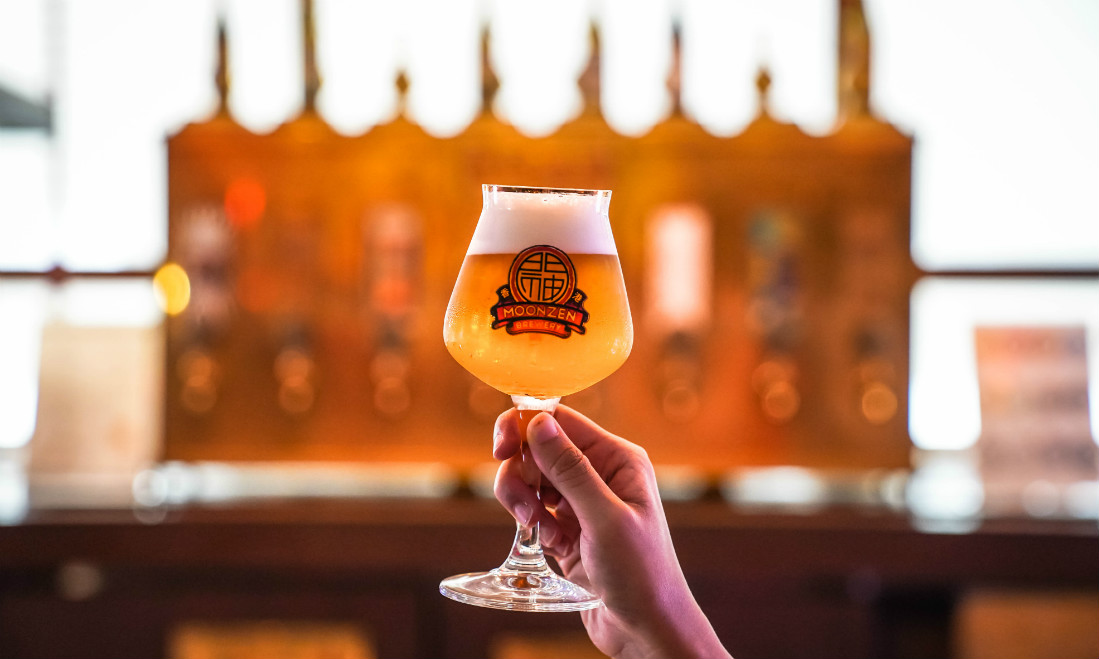
Beer Travelist: Speaking of that first year—how did Moonzen get started?
Laszlo: It’s actually my mistake.
Michele: (laughs) That’s the first time I’ve heard you say that!
Laszlo: I used to work as an oil engineer, but during that time I used to homebrew. After the Arab Spring I basically lost my job and was unemployed for a year, so I started a small homebrewery. People told me my beers tasted good and I should sell them, but I never thought it could be a viable business. That seed stuck, though, and after that I moved to a very small, 700-square-foot food factory—just me, brewing every day, with a monthly capacity of 800 liters.
Michele: It was tiny, but we were one of Hong Kong’s first three craft breweries, along with Young Master and Hong Kong Beer Company, but they were both much bigger.
Laszlo: For us, our growth model has always been slow and steady organic growth. We’ve never had some of these quality issue spikes that some Hong Kong breweries had that damaged their reputation. We’re very careful of that.
Beer Travelist: What’s the story behind your first beer, Thunder God?
Laszlo: That’s the one that pushed us to the market because it was the first beer that we perfected. We entered it into the Hong Kong International Beer Awards, and that year we won “Best Hong Kong Brewed Beer” and “Best Pale Ale.” All of a sudden then there’s this big pressure we have to maintain. That beer, though, became less and less bitter because what people liked in Thunder God were those striking aromas of freshness and citrus.
Beer Travelist: Switching topics—why Singapore and why now?
Laszlo: One of the main reasons is that we’ve reached that capacity, that economies of scale, where we can make our beers affordable here. The other reason is that the craft beer scene in Singapore isn’t quite as developed as it is in Hong Kong, so I think there’s a good opportunity to integrate our brewery. And that’s not just to craft beer bars, but to mainstream places like restaurants and hotels.
Related: In Singapore, Fresh Beer as Expressions of Beauty at Pink Blossoms Brewing
Michele: I think there are so many reasons to be here right now. Singapore has always been one of those places we had in mind, but before we were focusing on internal capacity and building a base in the Hong Kong market, because you can only go deep before you go wide. Our next focus was the team, and now with Trevor as the sales director, we can really focus on building a new market, and Singapore is an obvious one.
Laszlo: I do hope that eventually we’ll have our own venue here. Singapore may not really understand the brand if they just see the beer, so we want them to know what we’re about. And Singapore is a prime example of where people are still taken aback by the price of craft beer. So we need to really compete, almost on a Tiger level if we can.
Beer Travelist: How do you differentiate here?
Laszlo: It’s not just the fact that we have Chinese beers, but that we have a very strong Chinese cultural identity. I think people can look at one of our bottles and… it just resonates with the Chinese diaspora in places like Thailand, Hong Kong, and Singapore. That’s one of the main things—the branding. The beer itself is just us making really high quality beers.
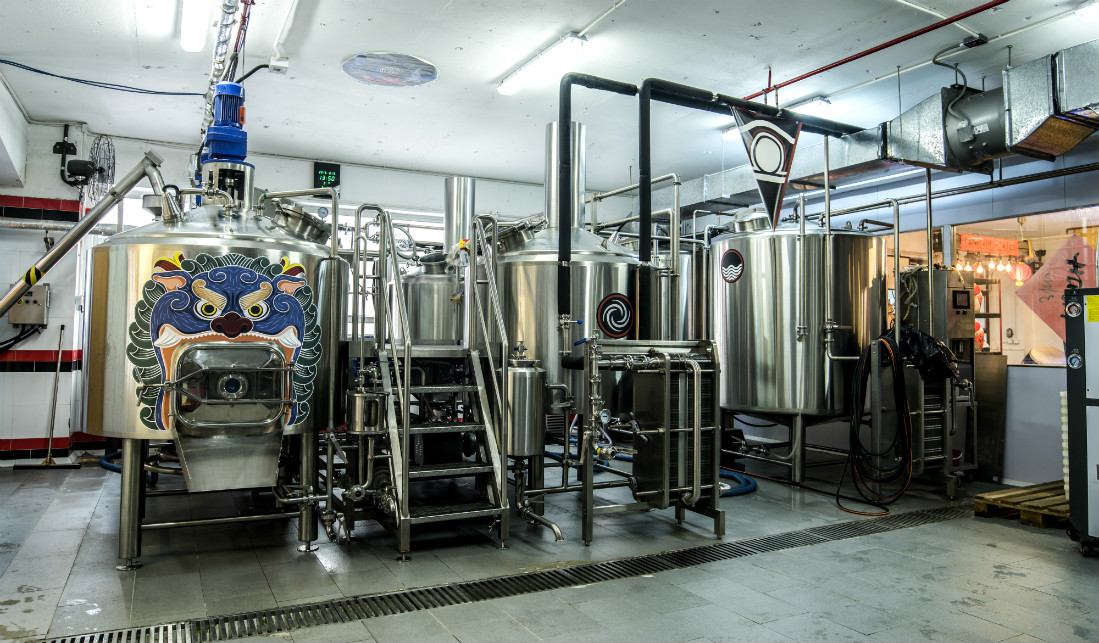
Michele: It’s also not just a random thing for us, like, ‘oh, let’s do a rice lager!’ As you know, the Provincial Series is something that is very cohesive—every beer we come out with has a story and fits in with the whole rest of the series. They’re like LEGOs.
Laszlo: I think a lot of other breweries have these random creations. We have a very limiting arena of what we’ll do; we’ll never be doing, you know, a pumpkin pie-spiced stout, so that gives our terrain a limit that we won’t go beyond, but what we do create is something in-depth.
Beer Travelist: How have things changed in Hong Kong over the past six years? Obviously there is loads more competition.
Laszlo: In terms of the economies of the market, people are not really looking for the freshest IPA anymore. They’re looking for a stable, well-brewed IPA that has good economies of margin, whereas before it was, you know, ‘try this crazy new triple-lupulin, double dry-hopped IPA.’
As you know it started with the beer geeks, and they kind of led the movement, but now I think a normal punter just wants an IPA or a Thunder God every single time because they know they like that beer.
Beer Travelist: You’re specifically referring to IPAs here. Is that by far the most preferred style in Hong Kong craft?
Laszlo: It’s the one we sell most, for sure. Trevor, in terms of the economies, how would you say the market has changed?
Trevor Au: Well, I think craft beer has become part of the normal beer selection in Hong Kong’s F&B outlets. So, in terms of sales, it started in the craft beer bars, and then to the high-end bars, hotels, and membership clubs, and then bit by bit to a lot of restaurants. With the economy down right now and a bit unstable, the bars just want to sell whatever they can sell, which means more opportunity for the craft beer world. When the economy is more stable, a lot of these bars just sell Carlsberg.
Beer Travelist: As far as the current political situation, are you experiencing anything specific to the brewery?
Laszlo: So far we’re seeing that instead of having a concentrated consumption in only certain bar areas, like Lan Kwai Fong and Soho, it’s kind of spread out. People don’t want to go to Central, or there’s a curfew, whatever it is—they just want to go home and drink a beer or go to their neighborhood bar. So we’re seeing more of the mom-and-pop shops ordering more, and less from the craft beer bars and other usual suspects.
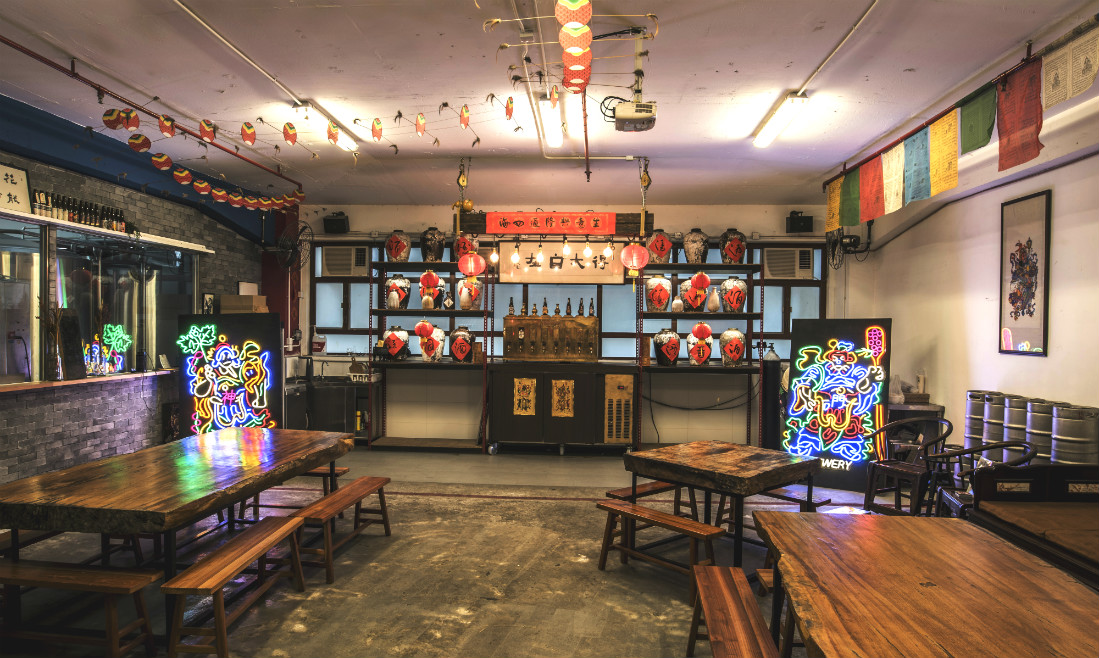
Beer Travelist: Last one—what can people expect at Moonzen Brewery’s weekend tour?
Laszlo: You’re welcomed into the Temple of Beer, and you get a tour of the whole brewery. We talk about everything from filtration and blending to brewing, fermentation, and packaging, and then there’s a free tasting session. We have eight beers on tap, which vary from the core menu to weird things we’ve done. People can then stay on, have dinner, and drink.
Michele: It’s self-service, ordering food in, very casual. A lot of people are regulars, like a group of four French guys who always bring their own games to play. Some Chinese will bring a roast goose to share.
###
Moonzen Brewery is based in Hong Kong. Brewery tours are available every Friday and Saturday. Premium Reserve imports and distributes Moonzen in Singapore.
All photos courtesy Moonzen Brewery; we took the bottle photos. This story was edited to the sound of Dub Trio’s Another Sound is Dying.


